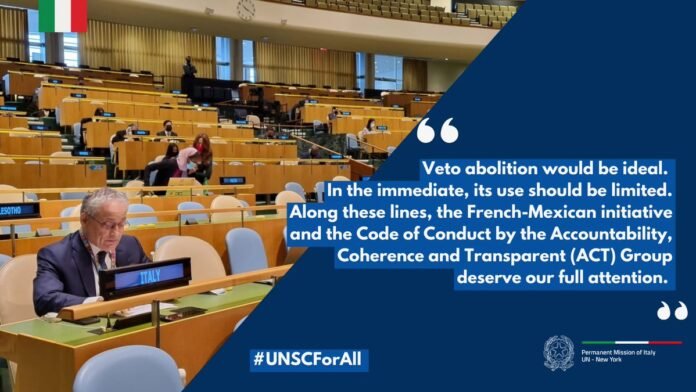NEW YORK, MARCH 7 – The Intergovernamental Negotiation platform on the reform of the Security Council met today at the United Nations to discuss issues such as the veto power of the five permament members and the categorisation of its membership. Italy spoke on behalf of the Uniting for Consensus (UfC) Group, of which it is the coordinator. “We saw only a few days ago the profound impact of the veto on the efficiency of the Security Council, with a paralyzing effect on decision-making capabilities”, said the Permanent Representative of Italy to the UN, Ambassador Maurizio Massari, in reference to the Council’s stalemate over the Ukrainian crisis. “There is no doubt: the veto is in contradiction with the principles of democracy, efficiency and sovereign equality between states. Although it may have been envisaged in a specific historical context, today it no longer has a plausible justification”, the Ambassador continued.
Its abolition would be ideal, but the UfC countries recognise that it is unlikely to happen, given the provision of Article 108 of the UN Charter. UfC’s proposal is to take a gradual approach and try to define the best ways to limit its use by the five permanent members (Russia, China, France, United Kingdom and United States).
The veto power within the Council is, however, directly linked to the status of permanent member and therefore on the issue of categorisation of the membership. Led by Italy, UfC supports an enlargement of the Council only among its non-permanent members: to create new permanent seats would in fact only validate new privileged positions of certain States over others.
To best represent the reality of a changing world “the logic of the past, based on winners and losers, cannot be applied (even though adopted in a unique historical context, that of the post-second world war), nor can classifications based on the criterion of ‘power’ which would accentuate the hierarchies and divisions between the various countries and penalise the smaller ones”, the Ambassador claimed.
Why should some Member States today, and not others, have the right to become permanent members of the Council? On the basis of which objective criteria and recognised by the entire UN membership? And would the criteria for selecting the new permanent members be met by the selected countries 25 or 50 years from now? What about the logic of democracy and equality between Member States, which is at the hearth of the United Nations?
The reformed Council imagined by the UfC would consist of 26 seats in total: to the current 10 non-permanent elected members 11 would be added, for a total of 21 non-permanent elected members. Nine of these eleven additional seats would have a longer mandate (this in order to meet the demands of those Member States wishing to serve for longer periods) and would be elected by regional groups, in order to ensure a more balanced and equitable representation mainly at the benefit of developing countries (above all, African, Asia-Pacific and small island states), historically penalised in terms of participation in the Council. (@Onuitalia)

